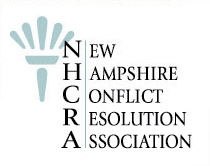Click the heading or the list to the left to find a practitioner in the field listed.
There are several different types of alternative dispute resolution (ADR) processes. NHCRA believes that one of these is a better alternative than litigation in the overwhelming majority of cases. Below is a list and brief description of some of these alternatives.
Conflicts in families are especially delicate, and preserving familial relationships can be vitally important. A skilled ADR practitioner can help guide the parties through the issues to reach a better understanding, engage in improved communication and a find a resolution that everyone feels is fair and reasonable.
- Divorce settlements
- Dissolutions of Civil Union
- Parenting Plans
- Post- Divorce resolutions
- Elder Decisions
- Other family conflicts
Traditionally, resolving legal disputes over an estate or a trust often meant litigation during a time of grieving. Probate ADR approaches are intended to help parties resolve issues without having to go through the emotional effect of litigation.
Conflicts within an organization can negatively impact its culture and reduce productivity. A skilled conflict resolver can help members of an organization to focus on their common mission and address the obstacles to reaching their goals.
- Small Business workplace disputes and HR support
- Non-profit organizational conflicts
- EEOC complaints
- Breach of contracts
- Strategic planning
- Team Building and/or organization transitions, restructuring and/or dissolution
Civil Mediation allows parties that may not normally have a formal mechanism to lodge complaints an opportunity to create an unofficial solution.
- Neighborhood disputes
- Landlord/Tenant issues
- HOA Conflicts
- Community Facilitation
- Small Business
- Consumer
A comprehensive approach to the dispute resolution process, collaborative law allows separating couples to work with a collective group of professionals that include lawyers, coaches and financial advisors. During this process the parties and collaborative professionals work towards a fair settlement that avoids litigation and is mutually agreed upon by all parties.
- Divorce settlements
- Dissolutions of Civil Union
- Parenting Plans
- Post- Divorce resolutions
- Elder Decisions
- Pre and Post-marital contracts.
- Other family conflicts

